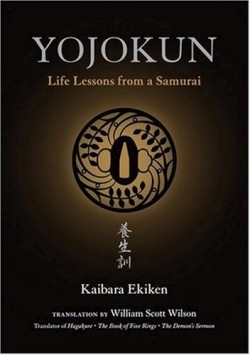
Yojokun
Life Lessons from a Samurai
Japanese is an extraordinarily challenging language for foreigners to speak, let alone read, yet William Scott Wilson has demonstrated an amazing gift for translating classical Japanese works into English in a way that holds true to the original work while finding modern relevance and meaning for the readers of today. The acclaimed translator of Hagakure, The Unfettered Mind, The Book of Five Rings, The Demon’s Sermon on Martial Arts, Taiko, The Life-Giving Sword, and many other immortal volumes, Wilson has once again lived up to his stellar reputation with this latest book. Written by samurai physician Kaibara Ekiken (1630—1714), Yojokun means “Lessons on Nurturing Life.” It is a very unique tome in feudal Japanese literature; rather than a martial com-pendium or Zen treatise, it is a compilation of precepts for living life to its fullest.
Ekiken, a prolific author, lived during the Takugawa Shogunate, an extraordinary era of peace in Japanese history where feudal samurai had to adjust to a world without constant warfare. Best known as a scholar of Confucianism, his diverse interests included agriculture, astrology, astronomy, biology, botany, linguistics, martial arts, mathematics, medicine, military strategy, topology, zoology, and more. He traveled extensively, meeting not only with some of the finest scholars of his day, but also with artisans and farmers in his search for wisdom. Unlike most of his peers, he wrote for the common man as well as for the elite classes, using unpretentious language that nearly anyone could understand. His book on the plants of Japan classified more then 1,500 species, while his book on the topography of Chikuzen Province (now part of Fukuoka Prefecture) is still studied today.
Warning against the dangers of excess, Ekiken preached balance in all things: eating, drinking, work, rest, and even sexual relations. His approach was preventative, believing that herbal medicine, acupuncture, moxa (heat) treatments, and hot springs, all common remedies of the day, should be considered treatments of last resort. In a society where his compatriots were focused on honor in death, Ekiken boldly declared the body a “treasured gift from Heaven and Earth,” stating that “to damage or destroy it thoughtlessly is the highest ingratitude.” By balancing one’s mental, physical and spiritual health Ekiken believed that most people could live happily and healthily for a hundred years.
Practicing what he preached, Ekiken lived to be eighty-four at a time when the average person rarely lasted more then sixty-two years. The book holistically covers everything from healthy eating and drinking to sleeping, bathing, preparing tea, choosing a good doctor, using medicine, sustaining old age, and raising children. Much of Ekiken’s advice is as relevant today as it was when first written nearly 300 years ago. Good advice is timeless.
This particular translation omits certain details of the original work that cover treatments best left to professionals such as recipes for medicinal herbal remedies. The only odd thing about the books is the translator’s use of the Chinese word ch’i rather then the Japanese ki when referring to the flow of life energy. Perhaps this is because Ekiken’s work frequently referred to The Yellow Emperor’s Classic on Medicine, the definitive medical text of the ancient world that came to Ja-pan via China. Nevertheless, Yojokun is a fascinating and surprisingly relevant read.
Reviewed by
Lawrence Kane
Disclosure: This article is not an endorsement, but a review. The publisher of this book provided free copies of the book to have their book reviewed by a professional reviewer. No fee was paid by the publisher for this review. Foreword Reviews only recommends books that we love. Foreword Magazine, Inc. is disclosing this in accordance with the Federal Trade Commission’s 16 CFR, Part 255.
